You know how important SEO is to the success of your business. From brand recognition to getting conversions and sales. But how do you know if your SEO is working? A high-quality SEO report helps you track and analyse the effectiveness of your SEO strategy. And because SEO reports indicate how your SEO agency is contributing to SEO goals it’s important to understand what they mean.
(The walkthrough features the SEMrush My Reports tool)
What are the performance metrics of SEO reports?
Performance metrics are important as they’re the numbers that help your business stay on track. They measure how well your website is doing and have 6 figures sourced from Google Analytics that include:
- Sessions
- New Sessions
- Pages/Session
- Bounce Rate
- Session Duration
- Goal Completion
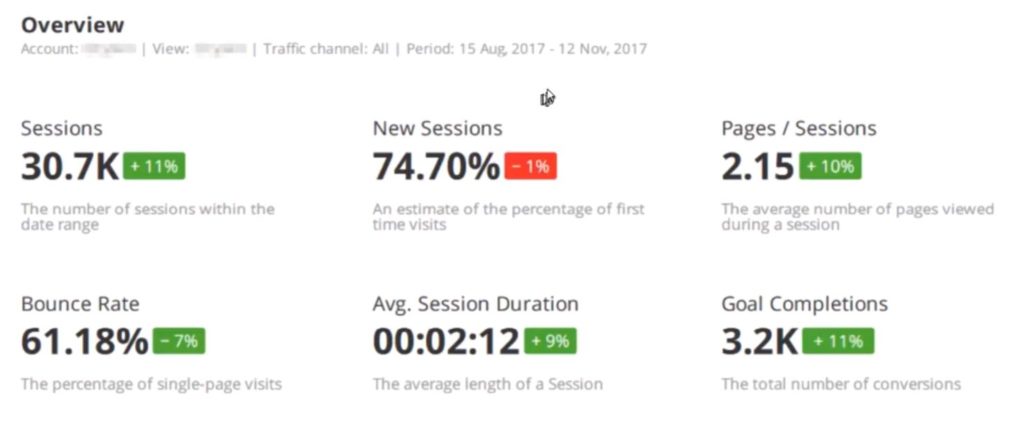
Other important metrics of the SEO report are:
- Estimated keywords
- Estimated traffic, and
- Traffic costs based on your search engine performance over the past 12 months.
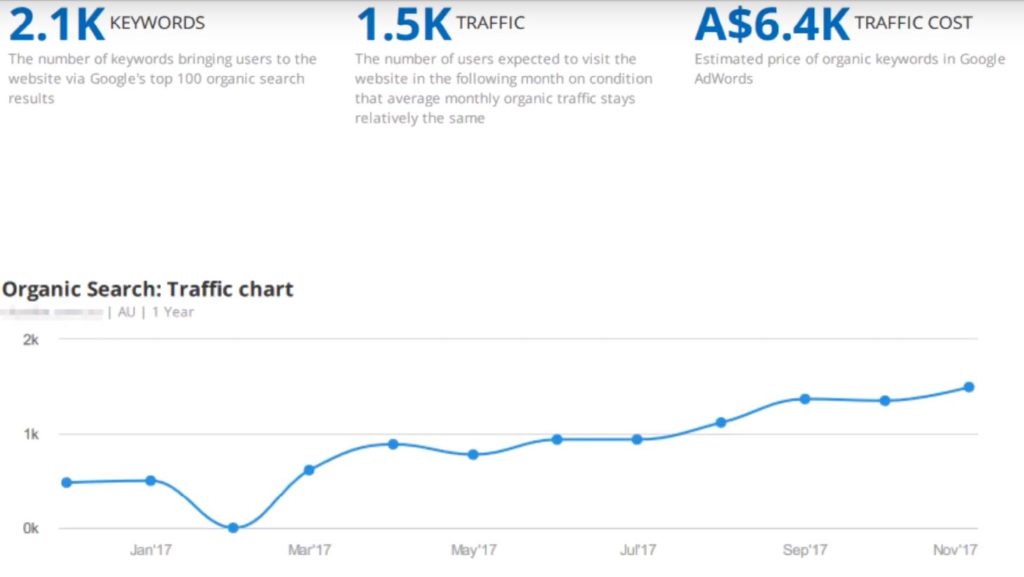
What are the competition metrics of SEO reports?
Competition metrics indicate where your website is positioned amongst major competitors. The organic search component indicates:
- How many search engine keywords your business is getting found for
- What the competition level is like
- How competitive other businesses are compared to your website
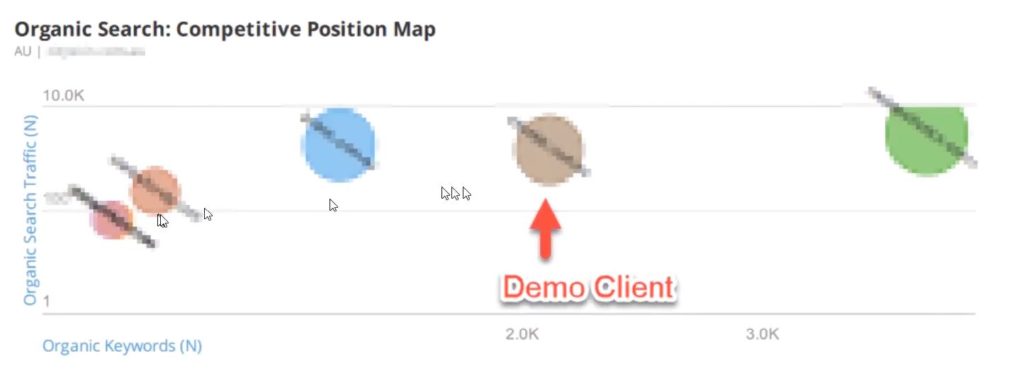
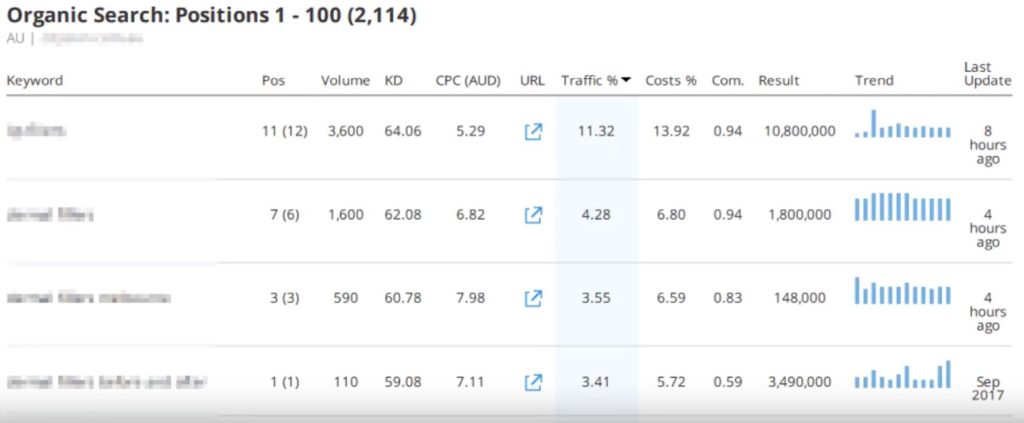
What is the best way to generate backlinks?
When it comes to earning backlinks there can be confusion and misunderstanding. It’s important to note that we never “try to trick Google” by manufacturing links or other spam-like methods. We focus on earning the links that you need for your website and know that Google analyses every link to position the website.
The best way to earn and generate backlinks is to create fantastic content that generates interest from your customers, gets read and shared. When this happens high-quality links are created. In our client example you’ll notice over the past 12 months there have been 149 backlinks from 57 referring domains and 57 referring IP addresses.
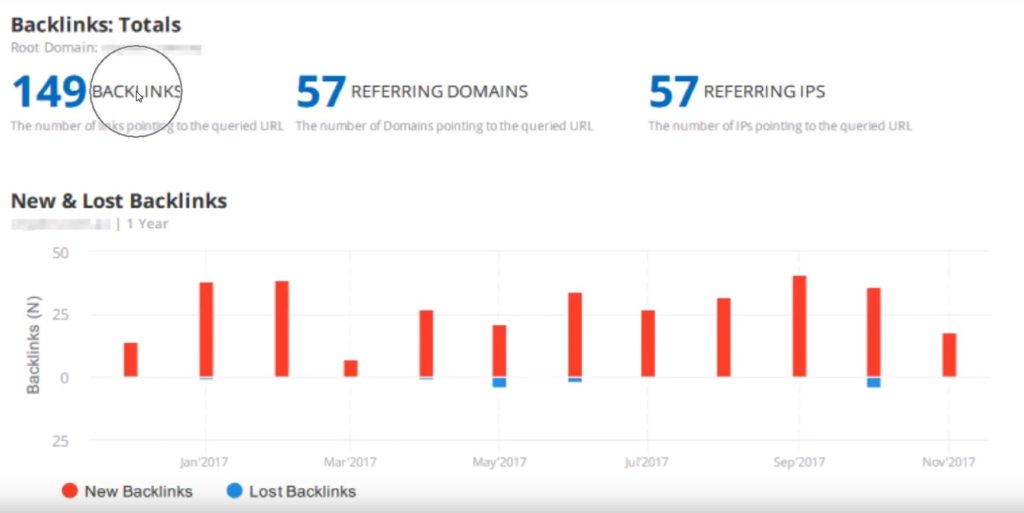
Where to get help with SEO reporting
SEO reporting on a weekly basis is important as it helps you see straight away how your business is going. As your high-quality content gets read and shared more, you’ll be able to see website improvements.
If you want to create your own SEMrush reports, follow this link to create a SEMrush account, and then follow the video tutorial below.
If you’re feeling daunted with SEO reports and what the data means you’re not alone. Email me with any questions about SEO reporting via our contact us form.
You know how important SEO is to the success of your business. From brand recognition to getting conversions and sales. But how do you know if your SEO is working? A high-quality SEO report helps you track and analyse the effectiveness of your SEO strategy. And because SEO reports indicate how your SEO agency is contributing to SEO goals it’s important to understand what they mean.
(The walkthrough features the SEMrush My Reports tool)
What are the performance metrics of SEO reports?
Performance metrics are important as they’re the numbers that help your business stay on track. They measure how well your website is doing and have 6 figures sourced from Google Analytics that include:
- Sessions
- New Sessions
- Pages/Session
- Bounce Rate
- Session Duration
- Goal Completion

Other important metrics of the SEO report are:
- Estimated keywords
- Estimated traffic, and
- Traffic costs based on your search engine performance over the past 12 months.

What are the competition metrics of SEO reports?
Competition metrics indicate where your website is positioned amongst major competitors. The organic search component indicates:
- How many search engine keywords your business is getting found for
- What the competition level is like
- How competitive other businesses are compared to your website


What is the best way to generate backlinks?
When it comes to earning backlinks there can be confusion and misunderstanding. It’s important to note that we never “try to trick Google” by manufacturing links or other spam-like methods. We focus on earning the links that you need for your website and know that Google analyses every link to position the website.
The best way to earn and generate backlinks is to create fantastic content that generates interest from your customers, gets read and shared. When this happens high-quality links are created. In our client example you’ll notice over the past 12 months there have been 149 backlinks from 57 referring domains and 57 referring IP addresses.

Where to get help with SEO reporting
SEO reporting on a weekly basis is important as it helps you see straight away how your business is going. As your high-quality content gets read and shared more, you’ll be able to see website improvements.
If you want to create your own SEMrush reports, follow this link to create a SEMrush account, and then follow the video tutorial below.
If you’re feeling daunted with SEO reports and what the data means you’re not alone. Email me with any questions about SEO reporting via our contact us form.

Peter Mead shares over 20 years experience in Digital and as an expert SEO Consultant. Peter draws further knowledge and experience from his involvement as a SEMrush Webinar host and a co-organizer of Melbourne SEO Meetup. Writing articles based on his hands-on analytical and strategic experience. Peter is passionate about contributing to client success and the improvement of the broader SEO community.
Peter can be found on some of these sites:
Hosting the SEMrush Australian Search Marketing Academy Webinar: https://www.semrush.com/user/145846945/
WordPress SEO Consultant: Peter Mead iT https://petermead.com/
Co-Organiser: Melbourne SEO Meetup https://www.meetup.com/Melbourne-SEO/
More information About Peter Mead